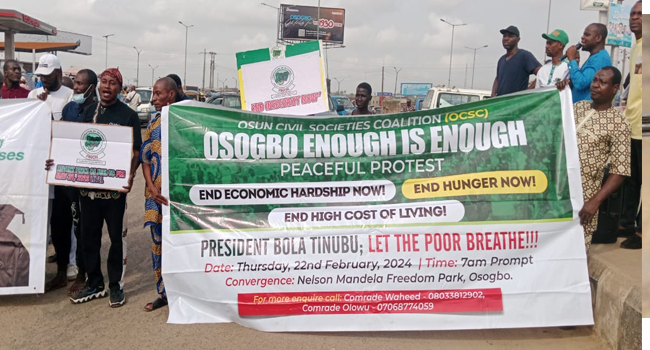Members of Civil Society Organisations (CSOs) have poured into the streets in Edo and Osun states over the economic hardship in the country.
Inflation in Nigeria has surged to 29 percent, coupled with the removal of fuel subsidies, leading to a sharp increase in the cost of living in recent months. These developments have sparked debates and protests across various parts of the country.
To express their discontent with the economic hardships stemming from these issues, Civil Society Organizations (CSOs) took to the streets in Benin City and Osogbo, the capitals of Edo and Osun states, respectively.
In Benin City, protesters marched from Kings Square to Akpakpava Road, brandishing placards with slogans such as “End Economic Hardship” and “FG End the Hunger in Nigeria Now” to underscore their demands.
Among the demonstrators in Edo State was Dr. Azemhe Azena, the gubernatorial candidate of the New Nigeria Peoples Party (NNPP) for the September 2024 election.
A similar scene unfolded in Osogbo, where protesters gathered at Nelson Mandela Park, calling on the Federal Government to “End the High Cost of Living”.
Monday’s protests represent the latest wave of demonstrations against the escalating cost of living in Nigeria.
Just a week earlier, hundreds had rallied in the southwestern city of Ibadan, expressing frustration with President Bola Tinubu’s leadership. The protesters displayed placards bearing messages such as “End bad government”, “End food scarcity”, and “End Nigerian hardship”.
Prior to these demonstrations, protests had also taken place in the North-Western state of Kano and in Niger State in the country’s North-Central region.
Upon assuming office last year, Tinubu terminated fuel subsidies and currency controls, resulting in a threefold increase in petrol prices and a surge in living expenses due to the depreciation of the naira against the dollar.
Despite mounting apprehensions regarding the economy, President Tinubu has consistently advocated for patience to enable the fruition of his reforms, asserting that they will facilitate foreign investment. However, these measures have had a severe impact on Nigerians.



